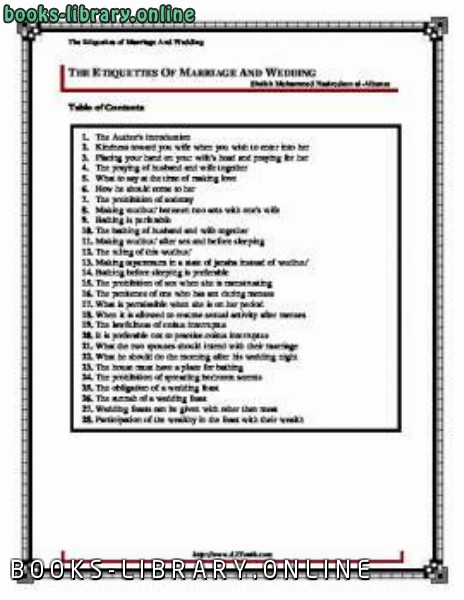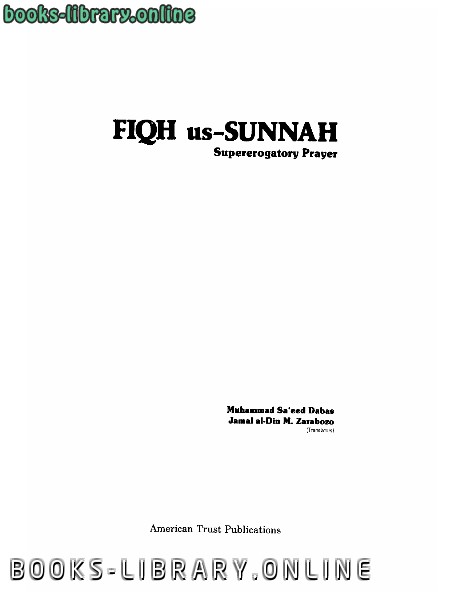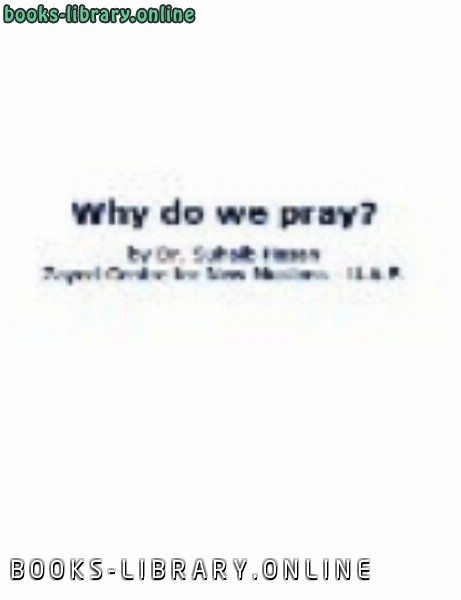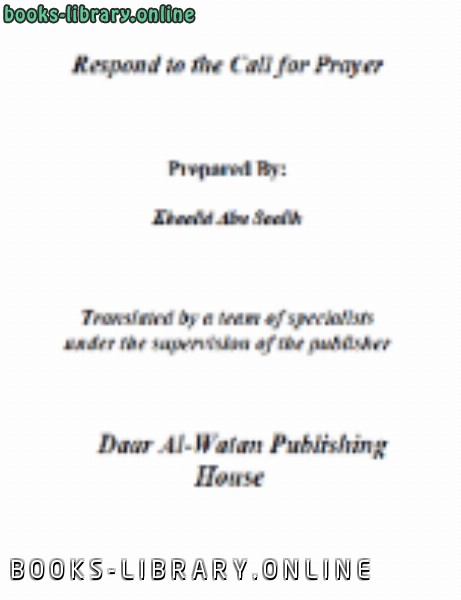كتاب Why do we pray
After a long and hectic day at work, how difficult it is for a tired person to go out to the mosque and concentrate on his prayers to Allah, the Almighty. Snuggled up in a warm and cozy bed, how difficult it is to get up at the call of the Mu'adhin: "Come to prayer! Come to success!" The famous doctor and philosopher, Ibn Sina (Avicenna), recalls such a moment in his life. One cold and icy night, he and his slave were resting at an inn in a remote part of Khurasan. During the night, he felt thirsty, so he called to his slave to bring him some water. The slave had no desire to leave his warm bed, so he pretended not to hear Ibn Sina’s call. But finally, after repeated calls, he reluctantly got up and went to fetch the water. A little while later, the melodious sound of the azaan (call to prayer) filled the air. Ibn Sina began to think about the person calling the people to prayer. "My slave, Abdullah, he mused, has always respected me and admired me. He seizes any opportunity to lavish praise and affection on me, but tonight he preferred his own comfort to my needs. On the other hand, look at this Persian slave of Allah: He left his warm bed to go out into the chilly night, he made ablution in the icy water of the stream, and then he ascended the high minaret of the mosque to glorify Him Whom he truly serves: "I bear witness that there is none worthy of worship except Allah. I bear witness that Muhammad is the Messenger of Allah." Ibn Sina records: "I learned the essence of true love, that love which results in complete obedience." The love of Allaah demands total and unconditional obedience. Allah, the Almighty says: Say [oh, Muhammad!]: "If you love Allah, follow me: Allah will forgive you your sins, for Allah is Oft-forgiving, Most Merciful" [Surah 3:31] PRAYER: A CRY OF THE INNER SOUL His arrogance and pride have often led man to behave as an oppressor and a tyrant. Some men have been carried away by their own self- importance that they have even claimed divinity. Pharoah, the ruler of Egypt, was among those who announced: "I am your supreme Lord!" With his sense of greatness and pride, Pharoah subjugated the Israelites and made their lives wretched and miserable. But is man really as strong and great as his ego tells him? The Qur'an tells us the reality of man’s nature: "It is Allah Who created you in a state of weakness, then gave you strength after weakness, then afterصهيب حسن عبدالغفار - ❰ له مجموعة من الإنجازات والمؤلفات أبرزها ❞ Why do we pray ❝ ❞ An Introduction to the Sciences of Hadith ❝ ❱
من كتب اسلامية باللغة الانجليزية كتب إسلامية بلغات أخرى - مكتبة كتب إسلامية.

قراءة كتاب Why do we pray أونلاين
معلومات عن كتاب Why do we pray:
to go out to the mosque and concentrate on his prayers to Allah, the
Almighty. Snuggled up in a warm and cozy bed, how difficult it is to
get up at the call of the Mu'adhin: "Come to prayer! Come to success!"
The famous doctor and philosopher, Ibn Sina (Avicenna), recalls such
a moment in his life. One cold and icy night, he and his slave were
resting at an inn in a remote part of Khurasan. During the night, he
felt thirsty, so he called to his slave to bring him some water. The
slave had no desire to leave his warm bed, so he pretended not to
hear Ibn Sina’s call. But finally, after repeated calls, he reluctantly got
up and went to fetch the water. A little while later, the melodious
sound of the azaan (call to prayer) filled the air. Ibn Sina began to
think about the person calling the people to prayer. "My slave,
Abdullah, he mused, has always respected me and admired me. He
seizes any opportunity to lavish praise and affection on me, but
tonight he preferred his own comfort to my needs. On the other hand,
look at this Persian slave of Allah: He left his warm bed to go out into
the chilly night, he made ablution in the icy water of the stream, and
then he ascended the high minaret of the mosque to glorify Him Whom
he truly serves: "I bear witness that there is none worthy of worship
except Allah. I bear witness that Muhammad is the Messenger of
Allah."
Ibn Sina records: "I learned the essence of true love, that love which
results in complete obedience." The love of Allaah demands total and
unconditional obedience. Allah, the Almighty says: Say [oh,
Muhammad!]: "If you love Allah, follow me: Allah will forgive you your
sins, for Allah is Oft-forgiving, Most Merciful"
[Surah 3:31]
PRAYER: A CRY OF THE INNER SOUL
His arrogance and pride have often led man to behave as an oppressor
and a tyrant. Some men have been carried away by their own self-
importance that they have even claimed divinity. Pharoah, the ruler of
Egypt, was among those who announced: "I am your supreme Lord!"
With his sense of greatness and pride, Pharoah subjugated the
Israelites and made their lives wretched and miserable.
But is man really as strong and great as his ego tells him? The Qur'an
tells us the reality of man’s nature: "It is Allah Who created you in a
state of weakness, then gave you strength after weakness, then after
للكاتب/المؤلف : صهيب حسن عبدالغفار .
دار النشر : .
سنة النشر : 2014م / 1435هـ .
عدد مرات التحميل : 5485 مرّة / مرات.
تم اضافته في : الأربعاء , 27 مارس 2019م.
حجم الكتاب عند التحميل : 91.3 كيلوبايت .
تعليقات ومناقشات حول الكتاب:
After a long and hectic day at work, how difficult it is for a tired person
to go out to the mosque and concentrate on his prayers to Allah, the
Almighty. Snuggled up in a warm and cozy bed, how difficult it is to
get up at the call of the Mu'adhin: "Come to prayer! Come to success!"
The famous doctor and philosopher, Ibn Sina (Avicenna), recalls such
a moment in his life. One cold and icy night, he and his slave were
resting at an inn in a remote part of Khurasan. During the night, he
felt thirsty, so he called to his slave to bring him some water. The
slave had no desire to leave his warm bed, so he pretended not to
hear Ibn Sina’s call. But finally, after repeated calls, he reluctantly got
up and went to fetch the water. A little while later, the melodious
sound of the azaan (call to prayer) filled the air. Ibn Sina began to
think about the person calling the people to prayer. "My slave,
Abdullah, he mused, has always respected me and admired me. He
seizes any opportunity to lavish praise and affection on me, but
tonight he preferred his own comfort to my needs. On the other hand,
look at this Persian slave of Allah: He left his warm bed to go out into
the chilly night, he made ablution in the icy water of the stream, and
then he ascended the high minaret of the mosque to glorify Him Whom
he truly serves: "I bear witness that there is none worthy of worship
except Allah. I bear witness that Muhammad is the Messenger of
Allah."
Ibn Sina records: "I learned the essence of true love, that love which
results in complete obedience." The love of Allaah demands total and
unconditional obedience. Allah, the Almighty says: Say [oh,
Muhammad!]: "If you love Allah, follow me: Allah will forgive you your
sins, for Allah is Oft-forgiving, Most Merciful"
[Surah 3:31]
PRAYER: A CRY OF THE INNER SOUL
His arrogance and pride have often led man to behave as an oppressor
and a tyrant. Some men have been carried away by their own self-
importance that they have even claimed divinity. Pharoah, the ruler of
Egypt, was among those who announced: "I am your supreme Lord!"
With his sense of greatness and pride, Pharoah subjugated the
Israelites and made their lives wretched and miserable.
But is man really as strong and great as his ego tells him? The Qur'an
tells us the reality of man’s nature: "It is Allah Who created you in a
state of weakness, then gave you strength after weakness, then after
Distributed by :www.islambasics.com
strength, gave you weakness and a hoary head: He creates what He
wills, and He is the All-knowing, the All-powerful"
[Surah 30:54]
Weakness in the beginning and weakness in the end: This is the
essence of man. He is so weak and helpless at birth that his entire
existence depends on his parents and his family. If he were to be
abandoned in these first crucial years, he could not survive on his own.
He needs a gentle and loving hand, not only in his infancy, but in his
childhood and even in his teenage years. As this child enters the years
of youth and independence, he begins to take control of his own life.
He looks with pride at his strong physique, his handsome features and
his many talents. He begins to despise those of lesser abilities, even
scorning his parents, who exhausted their own health to nurture him.
He becomes unjust and cruel, using his strength and vigour to
dominate others. He thinks he is master, free to act as he wills. But
does this youth, these good looks last forever? In only a few decades,
he begins to lose his strength...his youth is replaced by old age.
Weakness in the beginning, weakness in the end."
The message is clear: The real Master is Allah. He Alone is Mighty, He
Alone, is Great. He Alone is never tired, never needs rest, is never
dependent upon anyone. Allahu Akbar! - Allah is the Greatest! In our
everyday lives, we say a warm thank you for the small acts of
kindness which others do for us. So what about thanking Allah, Who,
in His infinite Mercy, has provided for every single one of our needs.
Just observe the beauty and perfection of the earth around you and
fall down in gratitude to your Lord.
PRAYER: THE ASCENSION FOR A BELIEVER
After the Messenger of Allah (salAllahu alayhi wasalam) was
commissioned for Prophethood, the first thing he was commanded to
do by Allah was to pray. The angel Jibreel u came to him and a spring
of water gushed out of the rocks in front of them. Jibreel u then
showed Allah’s Messenger how to make ablution. He then showed him
how to offer prayers to Allah. He began to pray two rak'ah twice a day,
once in the morning and once in the evening. He then went home and
showed his wife Khadijah what he had learnt from the angel Jibreel.
From that time, the Prophet (salAllahu alayhi wasalam) never went
through a day without praying. Just before his migration to Madinah,
Distributed by :www.islambasics.com
he was taken on a night journey to Jerusalem and then to the heavens
(Mi'raj). During this journey, Allah, Almighty, ordered him to pray five
times a day. This prayer was a gift given to every Believer to enable
him to experience a spiritual ascension five times a day. The Prophet
said: "The prayer is the Mi'raj of the Believer." It gives every Muslim
the chance to communicate with his Lord. During each prayer, the
Muslim recites Surah Al-Fatihah: This recitation is not a dull
monologue by the Believer, but Allah promises that it is a conversation
between Him and the worshipper. The Messenger of Allah reported
that Allah, the Almighty says: ‘When my slave says in his prayer: "All
praise is for Allah, the Lord of the worlds," I say: "My slave has praised
Me" When he says: "The Merciful, the Compassionate, Master of the
Day of Judgement," I say: "My slave has glorified Me." When he says:
"You Alone we worship and your Aid we seek," I say: "This is between
Me and My slave." When he says: "Show us the Straight Path," I say:
"This is for My slave, and I give My slave what he wants."[Hadith
Qudsi] The number of prayers in a day have been set at five by Allah
almighty. The believer has no choice in the matter but to obey. To
reduce the number of prayers would not only be disobedience, it would
also lose the benefits of prayer.
For example, a room is only good fro residence if it has four walls and
a roof. If only one wall or the roof were to be removed, what use could
it be? Similarly, the prayer will only achieve its purpose and be of use
on the Day when nothing except one's deeds will be of use, if it is
observed in the prescribed manner.
PRAYER: A PILLAR OF ISLAM
The Messenger of Alah once said: "Prayer is the pillar of religion.'
[Al-Baihaqi]
He also informed us that Islam is built upon five pillars, the second
being to establish prayer five times a day.
[Sahih Al-Bukhari]
This makes the image very clear: Islam is like a building supported by
five columns; remove just one column and the entire building
weakens. In the same way, when a person stops praying, his faith
becomes weak, and the mildest blows can cause it to crumble. The
prayer is so very important that the Prophet (salAllahu alayhi
wasalam) said:
Distributed by :www.islambasics.com
'Verily, between man and polytheism and disbelief is abandoning
prayer'
[Muslim] How true is this statement! If you look at people walking
down the road, it may be difficult to distinguish Muslims from non-
Muslims. Islam is not marked upon a believer's forehead, and neither
is Kufr stamped on an infidel's face. But at the time of prayer, you can
separate the two groups with ease. The believer will abandon his work,
his business to join the rows of Muslims in prayer, while the disbeliever
will carry on with his worldly affairs.
Surah Al-Muddathir narrates an interesting dialogue which will take
place on the Day of Judgement. The believers will ask the people of
Hell-fire:
"What has caused you to enter Hell?" They will say: "We were not of
those who used to offer their prayers. Nor we used to feed the poor;
and we used to talk falsehoods (all that which Allah hated) with vain
talkers, and we used to belie the Day of Recompense. Until there came
to use (the death) that is certain."
[Surah 72 :42-47]
The rejecters of truth are silent in this world, but in the next world
they will themselves speak the truth.
PRAYER IS LIKE A FORTRESS
Prayer is the basis of all good actions. Below are quoted two passages
of the Quran, both of which list a number of good actions. Prayer
comes before and after all good actions:-
A. Surah al-Muminun [23: 1-11]
"Successful indeed are the believers. Those who offer their Salat
(prayers) with all solemnity and full submissiveness. And those who
turn away from Al-Laghw (dirty, false, evil vain talk, falsehoods and all
that Allah has forbidden). And those who pay the Zakat. And those
who guard their chastity (i.e. private parts, from illegal sexual acts).
Except from their wives or (the captives and slaves) that their right
hands possess, -for then, they are free from blame. But whoever
seeks beyond that, then those are the transgressors. Those who are
faithfully true to their trusts and to their covenants. And those who
strictly guard their Salat (five compulsory congregational prayers at
their fixed stated hours). These are indeed the inheritors. Who shall
Distributed by :www.islambasics.com
inherit the Firdaus (Paradise). They shall dwell therein forever."
B. Surah Al-Marif: [70: 19-35]
"Verily, man (disbeliever) was created very impatient; irritable
(discontented) when evil touches him; and niggardly when good
touches him. Except those devoted to Salat (prayers), those who
remain constant in their Salat (prayers), and those in whose wealth
there is a known right, for the beggar who asks, and for the unlucky
who has lost his property and wealth, (and his means of living has
been straitened). And those who believe in the Day of Recompense,
and those who fear the torment of their Lord. Verily! The torment of
their Lord is that before which none can feel secure. And those who
guard their chastity (ie, private parts from illegal sexual acts), except
with their wives and the (women slaves and captives) whom their right
hands possess, -for (then) they are not to be blames. But whosoever
seeks beyond that, then it is those who are trespassers. And those
who keep their trusts and covenants, and those who stand firm in their
testimonies, and those who guard their Salat (prayers) well; such shall
dwell in the Gardens (i.e. Paradise) honored."
كتب إسلامية باللغة الإنجليزية
كتب إسلامية باللغة الإنجليزية
كتب فقه باللغة الانجليزية
قصص اسلامية باللغة الانجليزية pdf
مصطلحات اسلامية باللغة الانجليزية pdf
شرح الاسلام باللغة الانجليزية
الشريعة الاسلامية بالانجليزية
فقه السنة انجليزي
كتاب التوحيد بالانجليزية pdf
تعاليم الاسلام بالانجليزية
اسلامية باللغة الانجليزية
كتب اسلامية باللغة الانجليزية pdf
قصص اسلامية باللغة الانجليزية pdf
كتب فقه باللغة الانجليزية
شرح الاسلام باللغة الانجليزية
مصطلحات اسلامية باللغة الانجليزية pdf
تعاليم الاسلام بالانجليزية
الشريعة الاسلامية بالانجليزية
فقه السنة انجليزي
Book ? author : Suhaib Hasan
 مهلاً !
مهلاً !قبل تحميل الكتاب .. يجب ان يتوفر لديكم برنامج تشغيل وقراءة ملفات pdf
يمكن تحميلة من هنا 'تحميل البرنامج'

نوع الكتاب : pdf.
اذا اعجبك الكتاب فضلاً اضغط على أعجبني و يمكنك تحميله من هنا:


كتب اخرى في كتب اسلامية باللغة الانجليزية

The Etiquette of Marriage and Wedding PDF
قراءة و تحميل كتاب The Etiquette of Marriage and Wedding PDF مجانا

The Abridgement of the Prophet rsquo s Prayer Described PDF
قراءة و تحميل كتاب The Abridgement of the Prophet rsquo s Prayer Described PDF مجانا

fiqh ussunnah, supererogatory prayer فقه السنة صلاة التطوع PDF
قراءة و تحميل كتاب fiqh ussunnah, supererogatory prayer فقه السنة صلاة التطوع PDF مجانا

A Journey through the Islamic faith PDF
قراءة و تحميل كتاب A Journey through the Islamic faith PDF مجانا





